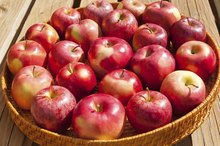What does fact checked mean?
At Healthfully, we strive to deliver objective content that is accurate and up-to-date. Our team periodically reviews articles in order to ensure content quality. The sources cited below consist of evidence from peer-reviewed journals, prominent medical organizations, academic associations, and government data.
The information contained on this site is for informational purposes only, and should not be used as a substitute for the advice of a professional health care provider. Please check with the appropriate physician regarding health questions and concerns. Although we strive to deliver accurate and up-to-date information, no guarantee to that effect is made.
Colitis Diet Foods to Avoid
Colitis, also known as ulcerative colitis, is characterized by inflammation and sores along the rectum and colon 1. Ulcers form in the areas of inflammation leading to bleeding, pus and diarrhea. Colitis is believed to be caused by an abnormal reaction of the immune system to the bacteria in the gut, according to the National Institute of Diabetes and Digestive and Kidney Diseases. Some foods may trigger a colitis reaction and should be avoided.
If you are experiencing serious medical symptoms, seek emergency treatment immediately.
Dairy Foods
Some people with colitis may have difficulty digesting foods with lactose, according to the Mayo Clinic. Lactose is a sugar found in dairy foods. To limit colitis symptoms, like diarrhea, people with colitis should avoid foods containing lactose, or use an enzyme to help digest the lactose called called lactase. People who cannot eat dairy foods should find an alternative source of calcium such as fortified soymilk, spinach or a supplement.
- Some people with colitis may have difficulty digesting foods with lactose, according to the Mayo Clinic.
- To limit colitis symptoms, like diarrhea, people with colitis should avoid foods containing lactose, or use an enzyme to help digest the lactose called called lactase.
High Fiber Foods
What Foods Can You Eat If You Have Crohn's Disease or Colitis?
Learn More
Most people need to eat more fiber because of its health benefits. But for people with colitis, foods high in fiber can cause more abdominal pain, gas and diarrhea, according to the Mayo Clinic. High fiber foods that people with colitis may need to avoid include:
- apples
- bananas
- blueberries
- figs
- grapefruits
- pears
- raspberries
- avocados
- carrots
- kale
- popcorn
- potatoes with the skin
- bran
- oats
- brown rice
- whole wheat breads
- legumes
- peas
- nuts
Some people with colitis may not be able to tolerate raw fruits and vegetables but can tolerate them cooked, according to the Mayo Clinic. People with colitis should discuss fiber in their diet with their physician.
- Most people need to eat more fiber because of its health benefits.
- People with colitis should discuss fiber in their diet with their physician.
Gas-Producing Foods
Foods that create a lot of gas in the gut during digestion should also be avoided by people with colitis. Many of these foods are also high in fiber. Gas-causing foods to avoid include:
- broccoli
- cauliflower
- cabbage
- raw fruits
- raw fruit juices
- popcorn
- dried fruits
- legumes
- foods made with sorbitol
- oat bran
Caffeine Containing Foods
Gluten-Free Diet for Ulcerative Colitis
Learn More
Foods with caffeine also cause gastrointestinal distress in people with colitis. Caffeine containing foods to avoid include coffee, black and green tea and cola.
Alcohol
The Mayo Clinic advises that people with colitis should also avoid alcohol to limit flare ups. This includes beer, wine and hard liquor.
Related Articles
References
- MayoClinic.com: Ulcerative Colitis
- Kakodkar S, Mutlu EA. Diet as a Therapeutic Option for Adult Inflammatory Bowel Disease. Gastroenterol Clin North Am. 2017;46(4):745-767. doi:10.1016/j.gtc.2017.08.016
- Guadagnoli L, Mutlu EA, Doerfler B, Ibrahim A, Brenner D, Taft TH. Food-related quality of life in patients with inflammatory bowel disease and irritable bowel syndrome. Qual Life Res. 2019;28(8):2195-2205. doi:0.1007/s11136-019-02170-4
- Nakanishi M, Matz A, Klemashevich C, Rosenberg DW. Dietary Walnut Supplementation Alters Mucosal Metabolite Profiles During DSS-Induced Colonic Ulceration. Nutrients. 2019;11(5)
- Marcelino G, Hiane PA, Freitas KC, et al. Effects of Olive Oil and Its Minor Components on Cardiovascular Diseases, Inflammation, and Gut Microbiota. Nutrients. 2019;11(8):1826. Published 2019 Aug 7. doi:10.3390/nu11081826
- Crohn’s & Colitis Foundation. What Should I Eat? | Patients & Caregivers. www.crohnscolitisfoundation.org. Published 2019.
- Gubatan J, Mitsuhashi S, Zenlea T, Rosenberg L, Robson S, Moss AC. Low Serum Vitamin D During Remission Increases Risk of Clinical Relapse in Patients With Ulcerative Colitis. Clinical Gastroenterology and Hepatology. 2017;15(2):240-246.e1. doi:10.1016/j.cgh.2016.05.035
Writer Bio
Jill Corleone is a registered dietitian and health coach who has been writing and lecturing on diet and health for more than 15 years. Her work has been featured on the Huffington Post, Diabetes Self-Management and in the book "Noninvasive Mechanical Ventilation," edited by John R. Bach, M.D. Corleone holds a Bachelor of Science in nutrition.









